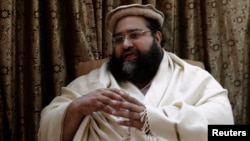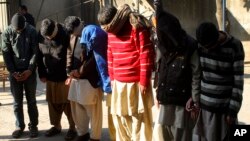A group of religious clerics in Pakistan has issued a fatwa, or religious edict, against Islamic State (IS) and "other terrorists and extremist groups.”
The Pakistan Ulema Council (PUC) has outlawed the use of religious terms like “Jihad Fi-Sabi Lillah,” meaning jihad for the sake of God or “Qital Fi-Sabi Lillah,” meaning murder for the sake of God or any activity related to “extremism or terrorism.”
The fatwa states that certain groups, including IS and Lebanon's Hezbollah, are re-interpreting religion to suit their purposes and “tagging their opponents with infidelity edicts to justify the killings and massacres.”
In a published booklet, the council claimed that Muslims across the world are facing challenges due to the acts of IS, Tehreek-e-Taliban Pakistan, Hezbollah, Houthi rebel tribes and other terrorist groups.
However, Muhammad Amin Shaheedi, a cleric with a Pakistani Shi'ite group Majlis e-Wahdat e-Muslimeen, denounced the mention of Lebanese Shi’ite group Hezbollah.
“Hezbollah is a democratic party which has its roots in the population, participates in elections, and is part of the Lebanese government,” he said.
He accused the PUC of being a Saudi-backed group trying to promote the Saudi agenda.
Saudi Arabia, a Sunni monarchy, is backing the Yemeni government in its fight against the Houthi rebels who are supported by Shi'ite Iran. The Saudis are also supporting groups that are fighting in Syria against Iranian-backed President Bashar al-Assad.
Hezbollah has reportedly sent its fighters to Syria in support of Assad.
According to the Institute for the Study of War, a Washington-based public policy research group, Hezbollah fighters have “operated openly and in significant numbers” in Syria and “have enabled the regime to regain control of rebel-held areas in central Syria and have improved the effectiveness of pro-regime forces.”
Muhammad Tahir Ashrafi, the central chairman of the PUC, denied the charges and said that they have added the names of all groups who were killing other Muslims and non Muslims.
Hezbollah, he said, was massacring its Sunni opponents in Syria, Iraq, and Yemen.
Ashrafi also explained that while his group’s stance against IS was not new, this was the first time they had put together a detailed edict in published form.
Ashrafi claims PUC has 110,000 clerics and scholars as its members.





